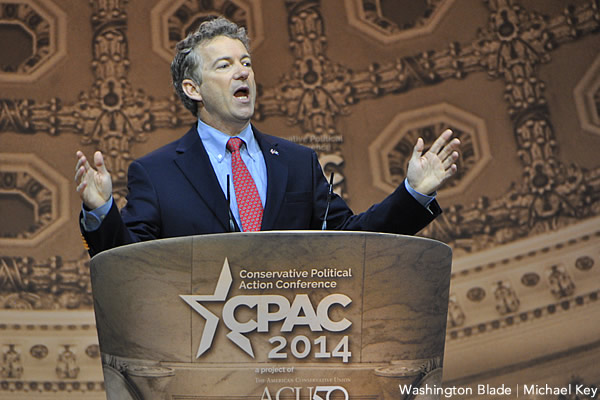News
Conservative struggle over gay rights emerges at CPAC
Santorum says he doesn’t ‘want to talk about redefining marriage’
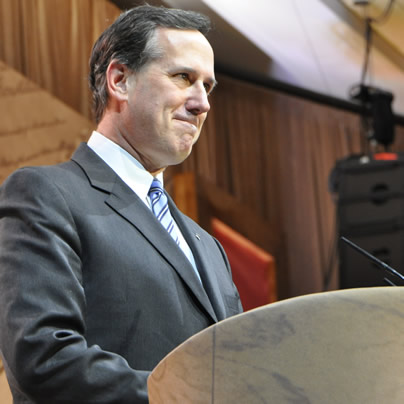
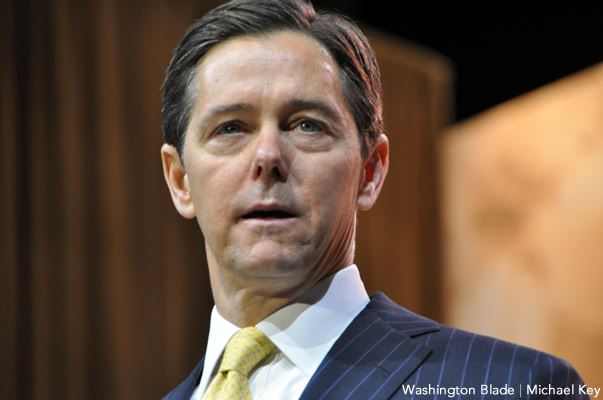
Ralph Reed speaking at the 2014 Conservative Political Action Conference. (Washington Blade photo by Michael Key)
NATIONAL HARBOR, Md. — To witness the conservative movement’s struggle with the widely held perception that nationwide marriage equality is imminent, you need not look further than the stage of the 2014 Conservative Political Action Conference.
After remaining silent on the first day of the conference, voices against same-sex marriage emerged on Friday, although they were restricted to certain conservative activists as others expressed conflict over the issue and elected Republican officials ignored LGBT rights altogether in their speeches.
Ralph Reed, founder of the Faith and Freedom Coalition, was among the most vociferous in his opposition to same-sex marriage as he accused U.S. Attorney General Eric Holder of committing a “brazen act of lawlessness” by counseling state attorneys general not to defend marriage laws against litigation.
It should be noted that during his speech to the National Association of Attorneys General, Holder said he believes it’s OK for state attorneys general not to defend a ban on same-sex marriage if they believe they’re unconstitutional, but he never instructed them to take that course of action.
“From now on, we’re going to accept — in 2014, 2016 and beyond — nothing beyond unapologetic, unalloyed ‘conservative’ that defends the principles upon which this nation was founded, including the biblical principles of freedom of religion, the sanctity of life and the sacred institution of marriage,” Reed continued.
Also injecting anti-gay sentiment before the estimated 8,500 attendees at CPAC was Oliver North, a Fox News commentator known for his role in the Iran-Contra scandal during the Reagan administration in the 1980s.
Ending his speech, North equated the conservative struggle to stop the advancement of marriage equality to abolitionists’ efforts in 19th century America to end slavery.
“Some say that we must ignore social issues, like the definition of marriage, the sanctity of life, religious freedoms,” North said. “I say those are not social issues, they are deeply moral and spiritual issues and should be part of America’s elections.”
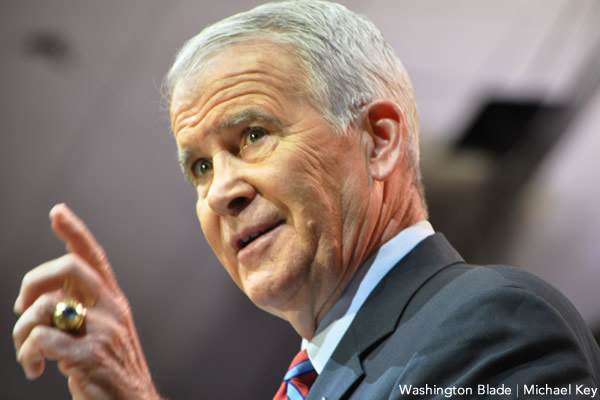
Oliver North speaking at the 2014 Conservative Political Action Conference. (Washington Blade photo by Michael Key)
North also made a veiled criticism of “Don’t Ask, Don’t Tell” repeal, saying the administration is treating U.S. troops like “laboratory rats” as part of a “social experiment.”
These conservative activists are pushing back against the advancement of marriage equality as numerous federal courts — most recently in Texas, Virginia, Kentucky, Utah and Oklahoma — have struck down state constitutional bans on same-sex marriage amid expectations the U.S. Supreme Court will deliver a final ruling on the issue in 2015.
The anticipated resolution of the marriage issue in the courts invoked the ire on stage of Eric Metaxas, a conservative pundit who insisted voters must decide the issue of marriage equality instead of judges.
“The idea of same-sex marriage, the idea of paying for contraceptions, we should let the voters decide,” Metexas said. “This is the United States of America. We don’t need the ‘Mandarins of Justice’ to make these decisions; we’re supposed to trust the voters to make those decisions, and let the voters decide.”
But those considered possible 2016 presidential candidates shied away from the issue of marriage equality.
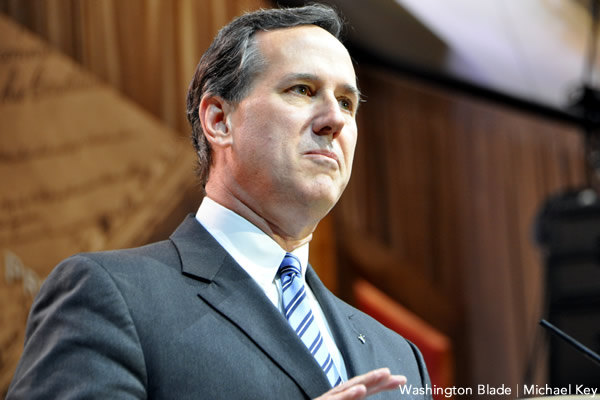
Former Sen. Rick Santorum (R-Pa.) speaking at the 2014 Conservative Political Action Conference. (Washington Blade photo by Michael Key)
Rick Santorum, known for his opposition to same-sex marriage and support for a U.S. constitutional amendment banning same-sex marriage, expressed regret on stage that he became known for that viewpoint over the course of his 2012 presidential bid.
“I don’t want to talk about redefining marriage; I want to talk about reclaiming marriage as a good for society and celebrating how important it is for our economy,” Santorum said to applause.
Santorum continued to discuss the importance of the institution of marriage itself, saying businesses could advance it by offering marriage counseling as a benefit.
Amid the (often disputed) perception that Pope Francis is more lenient on gay rights, particularly after his recent suggestion he could support civil unions, Santorum, who’s Catholic, commended the pontiff for saying the Catholic Church should steer away from social issues.
“He’s going out there and not talking about what the Christian faith is against, he’s going out there and talking about what we’re for,” Santorum said. “He hasn’t changed a single policy. He won’t change a single policy. But what he’ll do is he’ll go out there and talk about the good news to a hurting world because he believes that that’s what the world needs.”
One event at CPAC that demonstrated the tension within the conservative movement on marriage equality, although the discussion wasn’t completely dedicated to the issue, was a panel titled, “Can Libertarians and Social Conservatives Ever Get Along?”
One question debated was protecting religious liberties of individuals as marriage equality advances. The issue for panelists wasn’t so much whether there should be marriage equality, but whether it should be imposed by judicial fiat.
Michael Medved, a conservative pundit and host of “The Michael Medved Show,” said the issue has come down to religious liberty and insisted social conservatives and libertarians should agree that states should be able to decide for themselves the marriage issue without interference from the federal government.
“The idea that New York and California may have legitimated, or recognized, decided that those states should sponsor gay marriage doesn’t mean that Texas should be compelled by overreaching courts, or anyone else, to sponsor and legitimate gay marriage,” Medved said.
Alexander McCorbin, executive director of Students for Liberty, represented the opposite end of the conservative spectrum and said on the panel that marriage equality is “the civil rights issue of the 21st century.”
“There’s state-sponsored discrimination against various associations between individuals,” McCorbin said. “We’re talking about the denial of basic rights and privileges of individuals in committed relationships — the only difference being their sexual orientation.”
But McCorbin was rebuked on stage by Medved, who said believing a fundamental right to same-sex marriage is inconsistent with libertarianism.
“You are saying that nine unelected judges should impose their will and their judgement on the sovereign states, all 50 sovereign states and the citizens therein, in terms of something as fundamental to society as the definition of family and the definition of marriage,” Medved said.
Making a point that was derided by gay bloggers and the watchdog group Media Matters, Medved also said the idea that any state had prohibited same-sex marriage is “a liberal lie” — possibly because same-sex weddings have been allowed, even though 33 states don’t recognize them as valid.
But Medved also signaled he nonetheless supports adoption by same-sex parents, which triggered applause in the audience (although one observer could be heard booing).
Matthew Spaulding, associate vice president of Allen P. Kirby Jr. Center for Constitutional Studies & Citizenship, insisted that religious liberties for objectors must be upheld and denied any link between same-sex marriage and interracial marriage.
“The fact of one’s color of one’s skin is a coincidence,” Spaulding said. “It has nothing to do with your character, right? The difference between a male and a female is something that is self-evident and obvious that we need to deal, and we can’t shut aside and turn it over to judges to tell us what to do.”
No one who is gay, nor any LGBT political group, had a voice on the panel despite its attention to the marriage issue. In an op-ed penned earlier this week in the Daily Caller, Log Cabin Republicans executive director Gregory Angelo asserted he had sought participation on a CPAC panel this year, but was rebuffed because the American Conservative Union, which runs the event, never responded to the request.
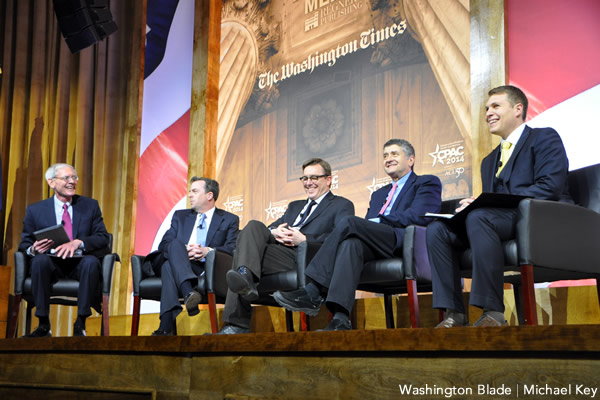
Members of the CPAC panel, ‘Can Libertarians and Social Conservatives Ever Get Along?’ discussed same-sex marriage. From left, Tom Minnery of CitizenLink, Matt Spaulding of the Allen P. Kirby Jr. Center for Constitutional Studies & Citizenship, Matt Welch of Reason Magazine, Michael Medved of the ‘Michael Medved Show’ and Alexander McCorbin of Students for Liberty. (Washington Blade photo by Michael Key)
Ignoring the issue of marriage, prominent Republicans speaking before the panel chose to tackle other issues, although they weren’t afraid to take Obama to task.
Texas Gov. Rick Perry, a known opponent of LGBT rights including allowing openly gay people in the Boy Scouts, turned his attention to deriding the advancement of welfare states under the Obama administration.
“The vision that wins out — either this big-government, protectionist nanny state version offered by liberal leaders or the limited-government, unsubsidized, freedom state offered by conservative leaders — will determine the future of our nation,” Perry said.
Sen. Rand Paul (R-Ky.), who has a reputation as a libertarian, delivered a speech criticizing the exposed data collection by the National Security Agency as he urged adherence to the U.S. Constitution.
“There is a great battle going on, it’s for the heart and soul of America,” Paul said. “The Fourth Amendment is equally as important as the Second Amendment, and conservatives cannot forget this.”
Even 2008 Republican presidential candidate turned Fox News commentator Mike Huckabee, known for championing social issues, was silent on stage about the issue of marriage equality, although he spoke more generally about upholding religious liberties in the country.
This struggle over gay rights emerges at CPAC following the publication this week of a Washington Post-ABC News poll showing a record-high 59 percent of Americans support same-sex marriage, while only one-in-three Americans oppose it.
That support is even higher among young voters, which make up the preponderance of attendees at CPAC. The poll found three-quarters of Americans younger than 30 support same-sex marriage.
Following the speeches on Friday, Log Cabin’s Angelo said there’s only one way for the debate to end if the conservative movement wants to thrive.
“The conservative movement can keep its head in the sand at its own peril — with the potential to lose more votes — or it can acknowledge us as here to stay, and grow the base, especially among millennial voters,” Angelo said. “That’s where we’re at in this movement. We want conservatives to win, but they need to acknowledge us as part of that winning coalition.”

In an official statement released at the reveal event Capital Pride Alliance described its just announced 2026 Pride theme of “Exist, Resist, Have the Audacity” as a “bold declaration affirming the presence, resilience, and courage of LGBTQ+ people around the world.”
The statement adds, “Grounded in the undeniable truth that our existence is not up for debate, this year’s theme calls on the community to live loudly and proudly, stand firm against injustice and erasure, and embody the collective strength that has always defined the LGBTQ+ community.”
In a reference to the impact of the hostile political climate, the statement says, “In a time when LGBTQ+ rights and history continue to face challenges, especially in our Nation’s Capital, where policy and public discourse shape the future of our country, together, we must ensure that our voices are visible, heard, and unapologetically centered.”
The statement also quotes Capital Pride Alliance CEO and President Ryan Bos’s message at the Reveal event: “This year’s theme is both a declaration and a demand,” Bos said. “Exist, Resist, Have Audacity! reflects the resilience of our community and our responsibility to protect the progress we’ve made. As we look toward our nation’s 250th anniversary, we affirm that LGBTQ+ people have always been and always will be part of the United States’s history, and we will continue shaping its future with strength and resolve,” he concluded.
India
Activists push for better counting of transgender Indians in 2026 Census
2011 count noted 488,000 trans people in country

India is preparing to conduct a nationwide Census in April, the first since 2011.
Interim projections based on the previous Census placed India ahead of China as the world’s most populous country. A Technical Group on Population Projections projection in July 2020, chaired by the Registrar General of India, estimated the country’s population in 2023 was 1.388 billion. Transgender Indians are now raising concerns about the data collectors and their sensitization.
Activists have raised concerns about whether data collectors are adequately sensitive to the community ahead of the Census. Government training material emphasizes household engagement, data privacy and sensitivity while asking personal questions, but publicly available flyers do not outline specific guidance or training related to recording trans identity during enumeration.
Concerns around the counting of trans people in India are not new.
The 2011 Census recorded around 488,000 trans people, a figure activists and researchers have described as a likely undercount due to stigma, misclassification, and a reluctance to self-identify. Subsequent surveys and field reports have pointed to inconsistencies in how gender identity is recorded and the absence of uniform sensitivity among Census data collectors. Rights groups and policy researchers have also warned that gaps in official data affect access to welfare schemes, legal recognition, and targeted public policy, making accurate counting central to future Census exercises.
A decade after the 2011 Census formally recorded trans people as a distinct category, multiple studies have continued to document entrenched socio-economic disparities. Research has pointed to lower literacy rates, limited workforce participation and barriers to healthcare access within the community.
A National Human Rights Commission-supported study cited in subsequent reporting found a significant proportion of trans respondents reported employment discrimination, underscoring the gap between formal recognition and lived economic inclusion.
Educational exclusion has remained a persistent concern within the trans community. Studies have documented higher dropout rates, lower literacy levels and barriers to continuing education, often linked to stigma, discrimination and limited institutional support. Policy researchers note that despite formal recognition in official data after 2011, targeted interventions addressing school retention and access for trans people have remained uneven.
Access to housing schemes has reflected similar gaps.
The Washington Blade in December reported only a small number of trans people have benefited from India’s flagship low-income housing program, despite its nationwide rollout and eligibility provisions. The findings underscored continuing barriers to inclusion in welfare delivery systems.
The Social Justice and Empowerment Ministry and the Office of the Registrar General and Census Commissioner did not respond to the Blade’s multiple requests for comment regarding sensitization measures for Census data collectors and the recording of trans identity in the upcoming Census.
Karnataka state in southern India last September conducted its first statewide baseline survey of gender minorities. The Department of Women and Child Development, in collaboration with the Karnataka State Women’s Development Corporation, launched the initiative to document the lives of trans people across 31 administrative districts.
When the results were released, the survey identified 10,365 trans people. The country’s 2011 Census, by comparison, recorded 20,266 trans people in Karnataka, nearly double the 2025 figure. The discrepancy raised questions about how the state’s recorded trans population appeared to decline over 14 years.
The discrepancy in Karnataka’s survey has intensified scrutiny over how gender minorities are counted. Reports questioned the methodology used in the 2025 exercise, which was conducted over 45 days beginning in mid-September. Instead of door-to-door enumeration, trans people were required to report to designated registration sites — primarily district-level public hospitals and sub-district government health facilities. The approach presented barriers for potential participants, particularly those in rural areas, those without reliable transportation, those wary of institutional settings due to prior discrimination, or those who did not know about the count, raising the possibility of exclusion.
Bihar state in eastern India in January 2023 conducted a caste-based survey that included trans respondents.
The final report identified 825 trans people in the state, compared with 40,827 recorded in the 2011 Census. Activists disputed the figure, calling it inaccurate and pointing to community estimates that suggested higher numbers, including in Patna, the state capital, raising concerns about significant undercounting.
The 2011 Census marked the first attempt to enumerate trans people at the national level, but researchers and activists have described the exercise as limited in scope.
It recorded 487,803 people under the “other” category, a classification used for respondents who did not identify as male or female. Analysts have argued that the figure likely underestimated the community’s size.
The Census questionnaire provided three sex categories — “male,” “female,” and “other” — a framework that critics said did not fully capture the diversity of gender identity and may have affected how some respondents chose to identify.
During the 2011 Census, enumeration practices varied across regions.
In states such as Tamil Nadu, local reporting indicated estimates were at times derived from existing administrative records, including state-issued trans identity cards, rather than solely through door-to-door identification. Such approaches risked excluding individuals who did not possess identity documentation or were not registered with welfare boards, raising concerns about gaps in coverage.
Official data from the Social Justice and Empowerment Ministry shows only a few hundred trans people as of early 2025 have been issued identity cards through the national portal, despite nearly 2,000 applications being submitted. Many are still pending or have been rejected.
Critics of the 2011 Census said many Census data collectors were not adequately trained or sensitized to engage with gender identity beyond traditional binary classifications. Similar, detailed guidelines specific to trans sensitization have not been publicly made available for the 2026 Census, according to an examination of training materials and official circulars.
Akkai Padmashali, a trans rights activist, told the Blade that Census data collectors in earlier exercises were often not sensitized and lacked awareness of intersex people and gender-diverse communities. She said trans people and other gender and sexual minorities continue to face social exclusion and require careful handling during door-to-door data collection. Padmashali called for targeted training of data counting officers and said the government should treat the issue as a priority, adding the trans population is likely to be higher than what was recorded in 2011 and efforts to make officials more sensitive to the community are necessary.
“We will definitely join our hands with this move the government of India has taken,” said Padmashali. “I think there should be proper guidance from the main in-charge people who are conducting this enumeration, and if no such proper information is given to these Census data collectors, it is difficult to gather any sort of information concerned.”
“This whole issue of self-identification — I think India, in its current situation, is not in such a way that it openly accepts people’s identities,” she added. “It will be challenging, it will be difficult, it will be a struggle to offer people the opportunity to express their identities as concerned. But to make sure those who are part of the sexual minority community are counted, I think we also take responsibility for educating people to be part of the enumeration.”
Padmashali said many people are not accustomed to using mobile devices and only a limited number are familiar with them. She said technology should not mislead or misguide the collection of information. Padmashali added she and other trans people plan to engage with Census data collectors and officials who organize the Census.
“Government should have local meetings,” said Padmashali. “Government should hold regional consultations on why the national enumeration is important, because we also know that from 2011 to 2026 is almost 15 years, and now we are here.”
“The government should hold local meetings, especially in their constituencies,” she added. “If the government meets with non-government organizations and civil society groups, this could become a more inclusive exercise across the country. India has a population of more than 1.4 billion, and I think this is the appropriate time to bring accurate statistics to help draft policies in the context of the larger community concerned.”
District of Columbia
Capital Pride board member resigns, alleges failure to address ‘sexual misconduct’
In startling letter, Taylor Chandler says board’s inaction protected ‘sexual predator’

Taylor Lianne Chandler, a member of the Capital Pride Alliance Board of Directors since 2019 who most recently served as the board’s secretary, submitted a letter of resignation on Feb. 24 that alleges the board has failed to address instances of “sexual misconduct” within the Capital Pride organization.
The Washington Blade received a copy of Chandler’s resignation letter one day after she submitted it from an anonymous source. Chandler, who identifies as transgender and intersex, said in an interview that she did not send the letter to the Blade, but she suspected someone associated with Capital Pride, which organizes D.C.’s annual LGBTQ Pride events, “wants it out in the open.”
“It is with a heavy heart, but with absolute clarity, that I submit my resignation from the Capital Pride Alliance Board of Directors effective immediately,” Chandler states in her letter. “I have devoted nearly ten years of my life to this organization,” she wrote, pointing to her initial involvement as a volunteer and later as a producer of events as chair of the organization’s Transgender, Gender Non-Conforming, and Intersex Committee.
“Capital Pride once meant something profound to me – a space of safety, visibility, and community for people who have often been denied all three,” her letter continues. “That is no longer the organization I am part of today.”
“I, along with other board members, brought forward credible concerns regarding sexual misconduct – a pattern of behavior spanning years – to the attention of this board,” Chandler states in the letter. “What followed was not accountability. What followed was retaliation. Rather than addressing the substance of what was reported, officers and fellow board members chose to chastise those of us who came forward.”
The letter adds, “This board has made its priorities clear through its actions: protecting a sexual predator matters more than protecting the people who had the courage to come forward. … I have been targeted, bullied, and made to feel like an outsider for doing what any person of integrity would do – telling the truth.”
In response to a request from the Blade for comment, Anna Jinkerson, who serves as chair of the Capital Pride board, sent the Blade a statement praising Taylor Chandler’s efforts as a Capital Pride volunteer and board member but did not specifically address the issue of alleged sexual misconduct.
“We’re also aware that her resignation letter has been shared with the media and has listed concerns,” Jinkerson said in her statement. “When concerns are brought to CPA, we act quickly and appropriately to address them,” she said.
“As we continue to grow our organization, we’re proactively strengthening the policies and procedures that shape our systems, our infrastructure, and the support we provide to our team and partners,” Jinkerson said in her statement. “We’re doing this because the community’s experience with CPA must always be safe, affirming, empowering, and inclusive,” she added.
In an interview with the Blade, Chandler said she was not the target of the alleged sexual harassment.
She said a Capital Pride investigation identified one individual implicated in a “pattern” of sexual harassment related behavior over a period of time. But she said she was bound by a Non-Disclosure Agreement (NDA) that applies to all board members and she cannot disclose the name of the person implicated in alleged sexual misconduct or those who came forward to complain about it.
“It was one individual, but there was a pattern and a history,” Chandler said, noting that was the extent of what she can disclose.
“And I’ll say this,” she added. “In my opinion, with gay culture sometimes the touchy feely-ness that goes on seems to be like just part of the culture, not necessarily the same as a sexual assault or whatever. But at the same time, if someone does not want those advances and they’re saying no and trying to push you away and trying to avoid you, then it makes it that way regardless of the culture.”
When asked about when the allegations of sexual harassment first surfaced, Chandler said, “In the past year is when the allegation came forward from one individual. But in the course of this all happening, other individuals came forward and talked about instances – several which showed a pattern.”
Chandler’s resignation comes about five months after Capital Pride Alliance announced in a statement released in October 2025 that its then board president, Ashley Smith, resigned from his position on Oct. 18 after Capital Pride became aware of a “claim” regarding Smith. The statement said the group retained an independent firm to investigate the matter, but it released no further details since that time. Smith has declined to comment on the matter.
When asked by the Blade if the Smith resignation could be linked in some way to allegations of sexual misconduct, Chandler said, “I can’t make a comment one way or the other on that.”
Chandler’s resignation and allegations come after Capital Pride Alliance has been credited with playing the lead role in organizing the World Pride celebration hosted by D.C. in which dozens of LGBTQ-related Pride events were held from May through June of 2025.
The letter of resignation also came just days before Capital Pride Alliance’s annual “Reveal” event scheduled for Feb. 26 at the Hamilton Hotel in which the theme for D.C.’s June 2026 LGBTQ Pride events was to be announced along with other Pride plans.
-

 Mexico5 days ago
Mexico5 days agoUS Embassy in Mexico issues shelter in place order for Puerto Vallarta
-

 Real Estate5 days ago
Real Estate5 days ago2026: prices, pace, and winter weather
-

 Theater5 days ago
Theater5 days agoJosé Zayas brings ‘The House of Bernarda Alba’ to GALA Hispanic Theatre
-

 Netherlands4 days ago
Netherlands4 days agoRob Jetten becomes first gay Dutch prime minister

